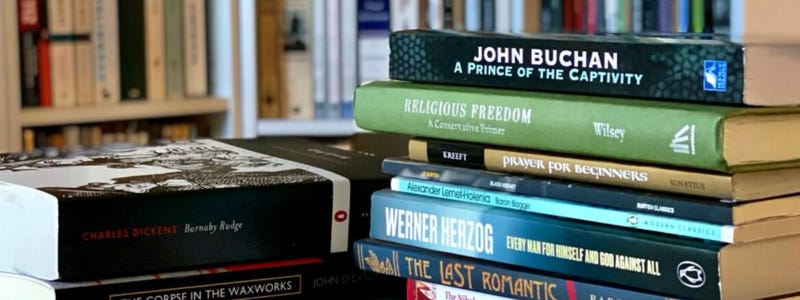Jordan's 5 Questions
@jordanmposs
Five questions answered by the BookshelfTracker community
Be sure to follow @jordanmposs on Instagram and Jordan M. Poss on Substack
1.) Did someone read to you when you were a child (who, what, when, where, why)?
Lots of people did. I was very blessed to have many relatives and teachers who read out loud to me, not only as a small child but through much of elementary school. I had the same teacher from 4th through 6th grade (small school), and she ended each day with a chapter from a book, almost always one we found involving. It was a great way to end the day.
But the people who stand out most in my mind for reading to me are my parents. A very early memory is my Mom reading me picture books--simple stuff like Byron Barton's Planes and Ships and Trucks--and my Dad reading to me from a series called ValueTales, which tried to teach lessons in character using historical figures (and cartoon animal sidekicks). Louis Pasteur is the one I remember most clearly, especially since they used the illustrations to help me deal with my fear of shots at the doctor. When I got older, they gave me many of the little paperback Illustrated Classics, and when I felt intimidated by their length, they helped me get started in them. Moby Dick was the first. My eventual favorite, and the first book over 100 pages that I remember reading on my own, was Treasure Island.
As for why, I reckon they thought it was important, but it always seemed to me that they just enjoyed it. It was a wonderful thing to share. I still remember many of the titles and stories and characters--the Berenstain Bears, a Little Golden Book about a runaway cat called Polly's Pet--and have shared many of the same books with my kids.
2.) What's the first book you remember reading that had a lasting effect on you?
Probably Polly's Pet, that Little Golden Book I mentioned. I still feel the homesickness and the message of unconditional love in that story powerfully, and I've been a bit of a homebody ever since.
3.) What genre(s) do you love?
I teach history, so ancient and medieval (especially Post-Roman or Late Antiquity, Anglo-Saxon, and Viking Age history) texts as well as recent secondary histories of those periods, plus general military history. A lot of the latter concerns the American Civil War and the World Wars. But I'll pick up a non-fiction book on any topic that catches my interest. Lately, I've been reading more biographies of writers I love--Poe, Ian Fleming, with more on Tolkien and Dante lined up for the future. And Dante reminds me of another love--epic poetry.
In fiction, I love classic novels, especially Dickens and Austen, adventure fiction like that of John Buchan, espionage and spy thrillers (Eric Ambler, Ian Fleming, John Le Carre, Len Deighton), crime fiction (Elmore Leonard especially), historical fiction of the older school (about evoking a past time and place rather than costumed romance), and I'll season my reading with a couple westerns and sci-fi novels a year. Lately, I've been reading a lot of Tim Powers and, through him, revisiting Philip K Dick.
Then there's "literary fiction," a label I don't entirely believe in, but does describe works that don't slot neatly into particular categories. Here, I tend to like older, Southern-flavored writers: Flannery O'Connor, Charles Portis, Cormac McCarthy, Shelby Foote, and Faulkner. Historical literary fiction that dovetails with my research areas in history--books like John Gardner's Grendel or Frederick Buechner's Godric--are also favorites. I don't keep up with much contemporary literary fiction, Ron Rash being a major exception.
I guess the shorter answer would be that I don't pay much attention to genre, but this is much of what I end up reading. It's hard to summarize.
4.) Has a book ever changed your life?
Certainly! There were a lot of childhood reads that proved formative, shaping my sensibilities, as well as later books that engaged me intellectually--challenging or testing a belief or, more rarely, answering a difficult question. Possibly the most important of the latter was Socrates Meets Jesus, by Peter Kreeft--and not even the book itself, which was good, but Kreeft's introduction, which clearly resolved a tension between faith and reason that I'd felt in high school and college years before I read it. Not only did it help me personally learn to think, but it also illumined past approaches to thinking that have helped me understand historical and philosophical subjects better. The right book at the right time.
5.) What attracts you to a book? The cover? Podcast? Recommendation from others?
It depends. I'll buy books or pick them up at the library on impulse sometimes, usually on the basis of their subject. But most of the time I read things I've heard about elsewhere--word-of-mouth from friends, a mention in a review of a movie or another book, a podcast discussion, a review in a magazine or history journal or online, or from mentions in other books. Finding a book I like, learning about the author and what he or she liked to read, and then seeking those books out--that's how I've discovered a lot of favorites. Call it word-of-mouth from beyond the grave.
*BookshelfTracker is an app that lets you organize the books you own, track who you lend them to, and more. Learn more on our website, bookshelftracker.com


